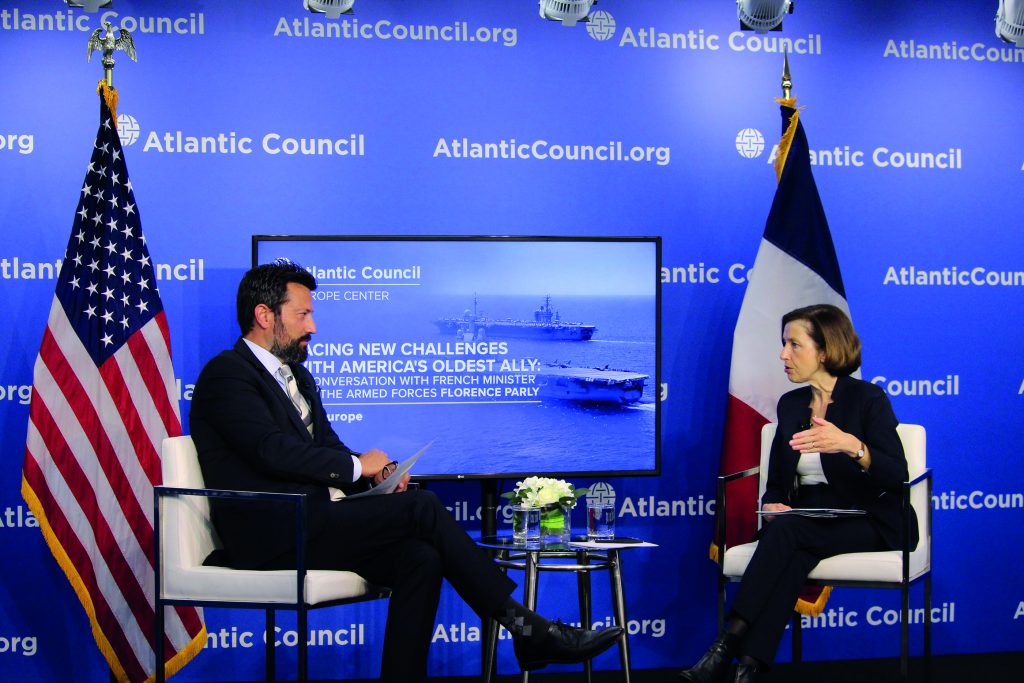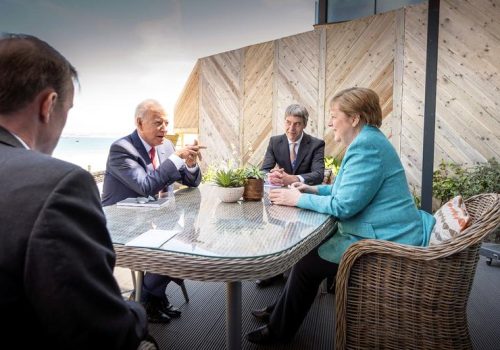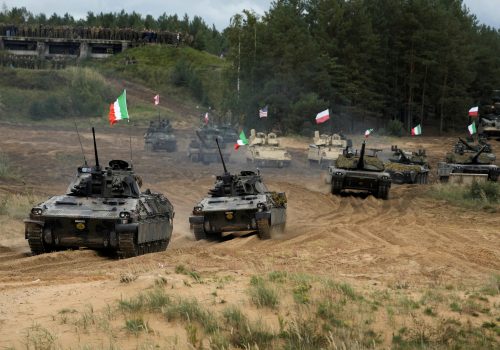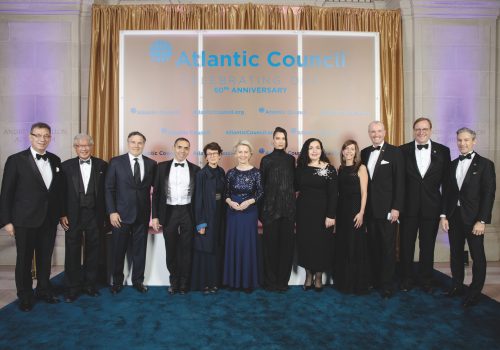Advancing a strong, ambitious Europe and a forward-looking transatlantic partnership.
The Europe Center’s mission is to promote leadership, strategies, and analysis to ensure a strong, ambitious, and forward-looking transatlantic relationship. Europe remains the United States’ political, economic, and security partner of first resort. After a stress test to the transatlantic relationship in recent years, this crucial relationship is in a period of rebirth but still faces challenges, including growing competition from rising authoritarian models for governance and their aggressive efforts to rewrite Europe’s security architecture in their interest. To meet these challenges, the Europe Center seeks to galvanize leadership and forge a strategy of renewal required to complete the vision of a strong Europe in partnership with the United States by engaging policymakers, economic leaders, and citizens on both sides of the Atlantic.
As the new US administration began to reshape the country’s historic partnership with Europe in 2021, the Europe Center worked to facilitate an effective and reengaged transatlantic relationship. As part of this effort, the center hosted over one hundred events and authored fifteen reports and issue briefs to confront the challenges facing transatlantic partners—from the effects of the withdrawal from Afghanistan to renewed Russian aggression—and promoted forward-looking proposals to update and upgrade the relationship.
Bridging rifts following the AUKUS fallout
The Europe Center provided the leading platform in Washington for European voices during the Australia-United Kingdom-United States trilateral security pact (AUKUS) dispute and served as the go-to resource for private and public dialogues to address the crisis. This work ensured there was continued constructive dialogue on defense issues and transatlantic coordination for strategies in the Indo-Pacific region.
US-European Union (EU) cooperation
The Europe Center strove to demonstrate the strategic value of US-EU cooperation through high-level convenings and transatlantic dialogues. In May, the inaugural US-EU Future Forum brought together dozens of US and European presidents, prime ministers, commissioners, and cabinet secretaries for one of the first and most comprehensive convenings around the US-EU relationship under the Biden administration. The forum featured the first public comments made by Deputy Secretary of State Wendy Sherman following her confirmation and provided a platform for one of the first internationally focused appearances of now German Foreign Minister Annalena Baerbock ahead of the German election campaign.
One of the most tangible components of renewed US-EU cooperation is the US-EU Trade and Technology Council (TTC), of which the Europe Center has been a leading proponent. Through the ideas generated in the center’s Transatlantic Digital Marketplace Initiative, the Europe Center advocated for the creation of such a US-EU dialogue and helped to shape the TTC’s agenda.
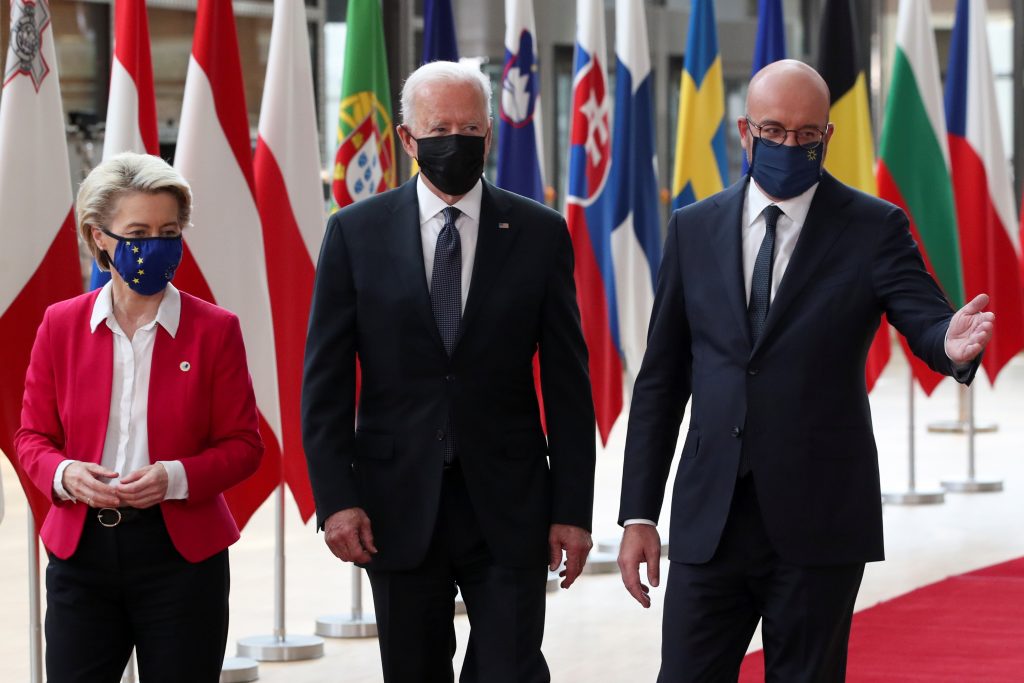
Understanding change in Europe
The Europe Center also increased its presence across Europe to continue to promote a strong and engaged Europe in the world.
In Paris, the center worked to underscore the importance of Franco-US cooperation and contextualize France’s foreign policy priorities, especially in anticipation of the French Presidency of the Council of the European Union. At the center of this effort was an #ACFrontPage event with President Emmanuel Macron in February, one of the Atlantic Council’s most-watched events of the year.
The Europe Center redoubled its focus on Germany as a key partner in the transatlantic alliance through the US-Germany Renewal Initiative. Throughout the German election campaign and subsequent coalition talks, the center provided in-depth analysis of this pivotal ballot with its #GermanyVotes series.
In Central and Eastern Europe, the Europe Center worked to engage policymakers and stakeholders to elevate the region as an active and productive member of the transatlantic community. This effort culminated with Central Europe Week in which the center convened high-level policymakers and cultural figures from the region and hosted Hungarian opposition leader Péter Márki-Zay in his first public appearance with an American audience.
Following the publication of the United Kingdom’s Global Britain strategy paper, the Europe Center sought to foster a productive relationship between the United Kingdom, United States, and Europe. Centered around the report Global Britain: An American Review, the center promoted the role of an active Britain on the world stage in cooperation with its European allies.
Regional initiatives
The Europe Center has also continued to be the home of regional programming and maintains an active presence with partnerships and fellows in all corners of the continent, anchored by its Stockholm office and its representation in the Western Balkans. The Europe Center is a leading proponent of the Three Seas Initiative, which promotes the commercial potential and strategic importance of supporting cross-border infrastructure development in Central and Eastern Europe.
To the south, the center’s Balkans Forward Initiative seeks to foster a democratic, secure, and prosperous Western Balkans. The Europe Center supported the launch of the Open Balkan Initiative, which aims to promote regional economic integration among the Open Balkan member states.
Vision for 2022
- Shaping a common US-EU agenda: Following 2021’s tumults and achievements, the Europe Center will advance a common agenda on US-European cooperation through support of the US-EU Trade and Technology Council, the Three Seas Initiative, regional economic integration in the Western Balkans, the future of European security, relations with China, and other key areas and initiatives in 2022.
- Navigating leadership changes: : Changes in European leadership will drive the intent of the Europe Center’s work. Elections slated in Serbia, Hungary, France, Slovenia, Malta, Sweden, Latvia, and Bosnia will reshape Europe’s future and the center will be a resource to newly elected and appointed transatlantic leaders.
- Remaining at the cutting edge of European debates: The Europe Center will continue to take a forward-looking focus in 2022 and shape the key debates at the forefront of the transatlantic community, including by promoting strong European defence compatible with NATO, fostering honest dialogue on EU enlargement and transatlantic engagement in the Western Balkans, thinking strategically about Russian and Chinese threats in Europe, engaging a Global Britain agenda, and shaping Europe’s digital transformation.
Next
Read the full report
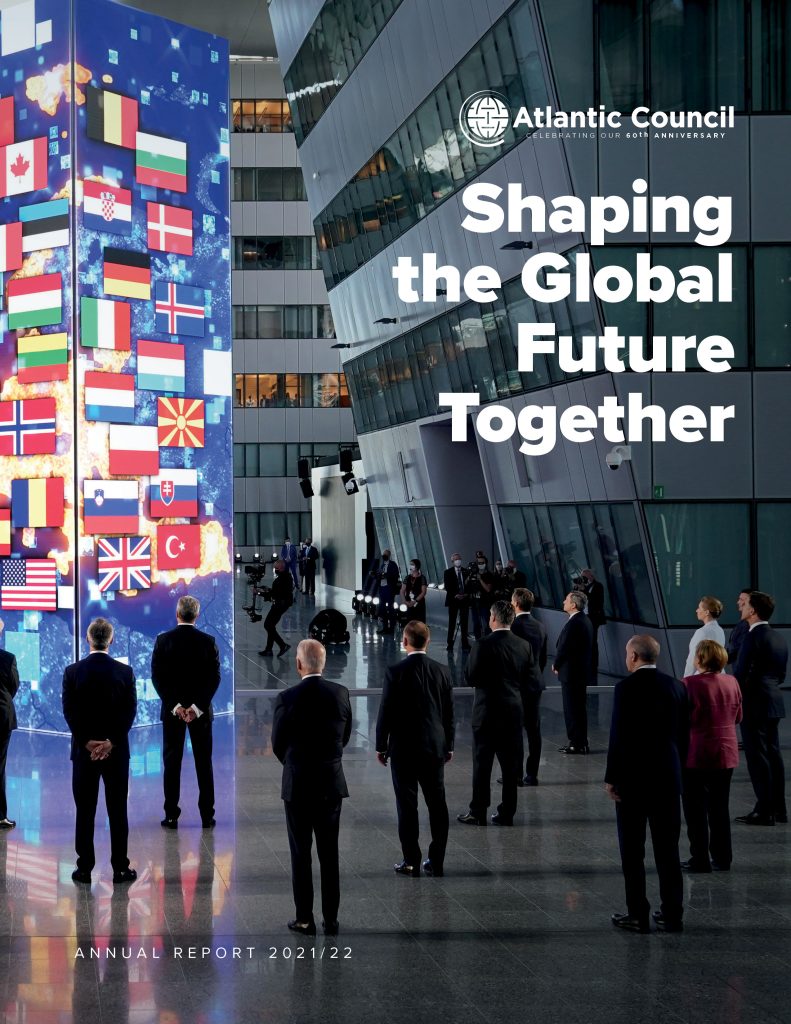
Annual Report 2021/2022
The Atlantic Council has never been more robust operationally, substantively, or financially in its sixty-year history. This comes at a time when our work has never been more crucial in the face of complex, daunting, and worldwide challenges.
Image: Florence Parly, French minister for the Armed Forces, joined the Atlantic Council on July 9, 2021, to discuss transatlantic cooperation on defense and France’s priorities for European defense with Defense One Executive Director Kevin Baron.
